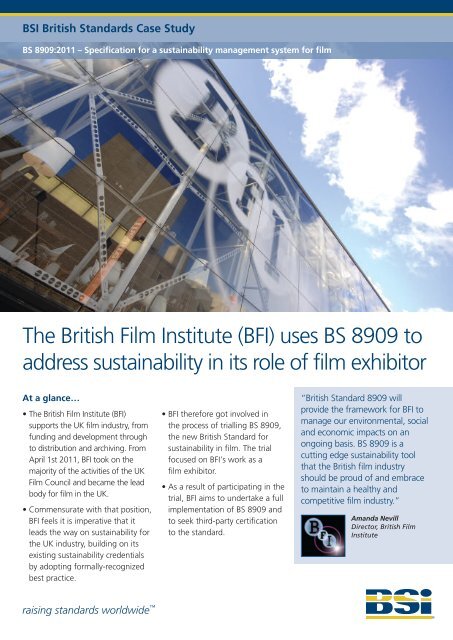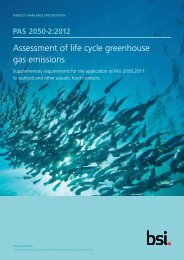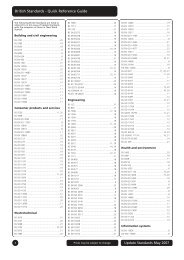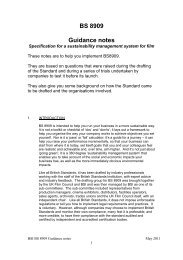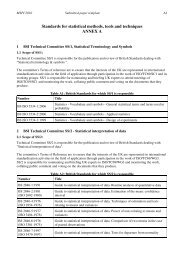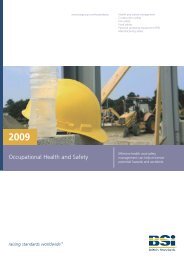The British Film Institute (BFI) uses BS 8909 to address ... - BSI Shop
The British Film Institute (BFI) uses BS 8909 to address ... - BSI Shop
The British Film Institute (BFI) uses BS 8909 to address ... - BSI Shop
Create successful ePaper yourself
Turn your PDF publications into a flip-book with our unique Google optimized e-Paper software.
<strong>BS</strong>I <strong>British</strong> Standards Case Study<br />
<strong>BS</strong> <strong>8909</strong>:2011 – Specification for a sustainability management system for film<br />
<strong>The</strong> <strong>British</strong> <strong>Film</strong> <strong>Institute</strong> (<strong>BFI</strong>) <strong>uses</strong> <strong>BS</strong> <strong>8909</strong> <strong>to</strong><br />
<strong>address</strong> sustainability in its role of film exhibi<strong>to</strong>r<br />
At a glance…<br />
• <strong>The</strong> <strong>British</strong> <strong>Film</strong> <strong>Institute</strong> (<strong>BFI</strong>)<br />
supports the UK film industry, from<br />
funding and development through<br />
<strong>to</strong> distribution and archiving. From<br />
April 1st 2011, <strong>BFI</strong> <strong>to</strong>ok on the<br />
majority of the activities of the UK<br />
<strong>Film</strong> Council and became the lead<br />
body for film in the UK.<br />
• Commensurate with that position,<br />
<strong>BFI</strong> feels it is imperative that it<br />
leads the way on sustainability for<br />
the UK industry, building on its<br />
existing sustainability credentials<br />
by adopting formally-recognized<br />
best practice.<br />
• <strong>BFI</strong> therefore got involved in<br />
the process of trialling <strong>BS</strong> <strong>8909</strong>,<br />
the new <strong>British</strong> Standard for<br />
sustainability in film. <strong>The</strong> trial<br />
focused on <strong>BFI</strong>’s work as a<br />
film exhibi<strong>to</strong>r.<br />
• As a result of participating in the<br />
trial, <strong>BFI</strong> aims <strong>to</strong> undertake a full<br />
implementation of <strong>BS</strong> <strong>8909</strong> and<br />
<strong>to</strong> seek third-party certification<br />
<strong>to</strong> the standard.<br />
“<strong>British</strong> Standard <strong>8909</strong> will<br />
provide the framework for <strong>BFI</strong> <strong>to</strong><br />
manage our environmental, social<br />
and economic impacts on an<br />
ongoing basis. <strong>BS</strong> <strong>8909</strong> is a<br />
cutting edge sustainability <strong>to</strong>ol<br />
that the <strong>British</strong> film industry<br />
should be proud of and embrace<br />
<strong>to</strong> maintain a healthy and<br />
competitive film industry.”<br />
Amanda Nevill<br />
Direc<strong>to</strong>r, <strong>British</strong> <strong>Film</strong><br />
<strong>Institute</strong><br />
raising standards worldwide
<strong>BS</strong>I <strong>British</strong> Standards Case Study<br />
How <strong>BS</strong> <strong>8909</strong> works<br />
• <strong>The</strong> standard works by asking<br />
organizations <strong>to</strong> state what<br />
they want <strong>to</strong> accomplish within<br />
their organization in terms of<br />
sustainability and <strong>to</strong> describe<br />
what they will do <strong>to</strong> achieve<br />
their aims.<br />
• Organizations then implement<br />
their plans and review actual<br />
performance against their initial<br />
objectives, which must take<br />
social, economic and<br />
environmental issues in<strong>to</strong> account.<br />
• Accurate records are kept<br />
throughout so that results can<br />
be reviewed and improved on<br />
in the future.<br />
• His<strong>to</strong>rically this Plan-Do-Check-<br />
Act cycle has proved an effective<br />
way of ‘holding’ organizations<br />
<strong>to</strong> their stated course. It has<br />
produced significant results for<br />
hundreds of thousands of<br />
organizations using other<br />
management systems standards<br />
such as ISO 9001 for quality<br />
management, and ISO 14001<br />
for environmental management.<br />
Getting <strong>to</strong> grips with <strong>BS</strong> <strong>8909</strong><br />
For the purposes of the trial, the<br />
management system would cover only <strong>BFI</strong>’s<br />
exhibi<strong>to</strong>r activities. In this respect, <strong>BFI</strong> runs<br />
two venues: <strong>BFI</strong> Southbank (formerly the<br />
National <strong>Film</strong> <strong>The</strong>atre) and <strong>BFI</strong> IMAX.<br />
<strong>The</strong> former shows over 1,000 films a year;<br />
the latter is one of the <strong>to</strong>p three most<br />
commercially successful cinema screens<br />
in the world.<br />
Exhibi<strong>to</strong>r activities cover a range of tasks that<br />
include researching the availability of films,<br />
and shipping, s<strong>to</strong>ring, screening and<br />
returning films <strong>to</strong> source. It also includes<br />
elements of ‘front of house’ such as the<br />
bar, restaurant, café facilities and shop.<br />
<strong>BFI</strong> felt that the standard would help it<br />
extend the work already underway on<br />
reducing carbon and provide a holistic<br />
framework for capturing and managing<br />
wider sustainability impacts. In addition<br />
<strong>BS</strong> <strong>8909</strong> would provide a business case<br />
for an organization-wide approach <strong>to</strong><br />
sustainability and enable senior management<br />
buy-in that would in turn allow for proper<br />
investment in sustainable solutions.<br />
Duncan McKeich, <strong>BFI</strong>’s Facilities Manager<br />
<strong>to</strong>ok on the role of Sustainability Manager for<br />
the trial, with Eddie Berg, the Artistic Direc<strong>to</strong>r<br />
of <strong>BFI</strong> Southbank assuming the position of<br />
Project Leader.<br />
Putting <strong>BS</strong> <strong>8909</strong> in place<br />
<strong>BFI</strong> began by deciding <strong>to</strong> focus its<br />
implementation around the creation of<br />
a new Sustainability Committee. This would<br />
meet quarterly with a chair from senior<br />
management (likely <strong>to</strong> be the Direc<strong>to</strong>r of<br />
<strong>BFI</strong> – Amanda Nevill) and representatives<br />
from all departments.<br />
HSE Manager Frank Horn would draft<br />
<strong>BFI</strong>’s statement of purpose and values for<br />
circulation among stakeholders and for sign<br />
off by the Direc<strong>to</strong>r and Board of Governors.<br />
He would also develop <strong>BFI</strong>’s sustainability<br />
policy for approval by the Sustainability<br />
Committee and for circulation <strong>to</strong> stakeholders<br />
for comment and review. This would ensure<br />
‘buy in’, support and an opportunity <strong>to</strong><br />
capture views from all stakeholders.<br />
<strong>The</strong>reafter the Sustainability Committee<br />
would develop a list of <strong>BFI</strong>’s sustainability<br />
issues and engage with stakeholders <strong>to</strong><br />
prioritize them. <strong>The</strong> Sustainability Manager<br />
would identify the stakeholder groups and the<br />
most appropriate ways <strong>to</strong> engage with them.<br />
Next the Sustainability Committee would<br />
develop objectives, targets and plans,<br />
ensuring that targets were challenging but<br />
achievable. In the first instance <strong>BFI</strong> would be<br />
likely <strong>to</strong> focus on energy, water use, waste<br />
minimization and health and safety issues.<br />
<strong>The</strong> standard also calls for users <strong>to</strong> consider<br />
what they would do when activities, products<br />
or services change unexpectedly. <strong>BFI</strong> felt this<br />
What is ‘sustainability’?<br />
<strong>BS</strong> <strong>8909</strong> <strong>uses</strong> the most widely adopted<br />
definition of sustainability, that of the<br />
World Commission on Environment and<br />
Development. It says that “sustainable<br />
development is meeting the needs of the<br />
present without compromising the ability of<br />
future generations <strong>to</strong> meet their own needs”.<br />
In practice, sustainable behaviour takes three<br />
areas in<strong>to</strong> consideration: social, financial and<br />
environmental. To improve their sustainability,<br />
organizations must safeguard social and<br />
economic resources and must not take more<br />
out of the planet than the planet can renew.<br />
Why sustainability in the film<br />
industry?<br />
<strong>Film</strong> is one of the most influential media<br />
on the planet. In sustainability terms, this<br />
influence carries both risk and a significant<br />
opportunity <strong>to</strong> improve.<br />
Aside from the moral imperative, sustainability<br />
influences all the levers that organizations use<br />
<strong>to</strong> create value: from helping recruit and<br />
retain staff <strong>to</strong> brand building. Crucially, there's<br />
also money <strong>to</strong> be saved from better resource<br />
and energy use. Exemplary sustainability<br />
performance leads <strong>to</strong> recognition from peers,<br />
audiences, inves<strong>to</strong>rs, stakeholders and NGOs.<br />
It reduces reputational risk and enhances<br />
competitiveness. It helps organizations get<br />
on <strong>to</strong>p of existing regula<strong>to</strong>ry requirements<br />
and ahead of future legislation.<br />
<strong>The</strong>re is also a clear correlation between<br />
sustainability performance and profitability.<br />
Using the well-respected MSCI World Index¹,<br />
analysis shows that companies which<br />
improved their sustainability performance<br />
between 2006 and 2008 financially outperformed<br />
their peers in 2008/9 by more<br />
than 11 per cent².<br />
¹ Morgan Stanley Capital International World Index ² http://greeneconomypost.com/global-1000-sustainable-performance-leaders-11432.htm
was useful – it noted that in the film industry,<br />
technology is always changing. For instance<br />
the move from film <strong>to</strong> digital raises a number<br />
of sustainability issues, e.g. digital cinema<br />
projec<strong>to</strong>rs are more sensitive and require<br />
additional cooling. Staff can also change –<br />
and at short notice – so it is necessary <strong>to</strong><br />
build in resilience by sharing information<br />
and s<strong>to</strong>ring it appropriately.<br />
<strong>BFI</strong> then mapped its current level of<br />
sustainable development on the Maturity<br />
Matrix in the standard’s Annex. This provides<br />
a way <strong>to</strong> benchmark organizational<br />
improvement over time. <strong>BFI</strong> also decided that<br />
day-<strong>to</strong>-day development and implementation<br />
of procedures would be the responsibility of<br />
the Sustainability Manager, and that ultimate<br />
responsibility for the sustainability performance<br />
of <strong>BFI</strong> belonged with the Direc<strong>to</strong>r.<br />
Operational control of the management<br />
system would be achieved through<br />
procedures implemented by the Sustainability<br />
Manager, and these would be appropriate<br />
<strong>to</strong> the user. For instance, a procedure for<br />
projectionists <strong>to</strong> minimize energy use could<br />
be ‘Do not switch on air conditioning until<br />
one hour before the first show.’<br />
Sustainability responsibilities would be built<br />
in<strong>to</strong> job descriptions and appraisals, but <strong>BFI</strong><br />
would look <strong>to</strong> have a collaborative rather<br />
than an adversarial approach <strong>to</strong> ‘non<br />
conformance’. <strong>The</strong>refore, stakeholder<br />
engagement (with the projectionists in this<br />
case) would identify what support would be<br />
required <strong>to</strong> keep targets on track – e.g. should<br />
a light be installed <strong>to</strong> let the projectionist<br />
know when the air conditioning is on / off?<br />
Reflections on the <strong>BS</strong> <strong>8909</strong> trial<br />
Duncan McKeich found the standard <strong>to</strong> be<br />
less than clear in some areas and overlong<br />
in others but appreciated that this is because<br />
<strong>BS</strong> <strong>8909</strong> is written in accordance with the<br />
structure and language of an international<br />
standard. <strong>BS</strong>I is already working <strong>to</strong> <strong>address</strong><br />
clarity by preparing explana<strong>to</strong>ry guidance.<br />
Notwithstanding, McKeich also commented<br />
that the trial had helped him understand that<br />
implementing <strong>BS</strong> <strong>8909</strong> “isn’t as onerous as<br />
I had initially thought.” He concluded that<br />
the standard would certainly help provide<br />
a framework for capturing and managing<br />
<strong>BFI</strong>’s sustainability impacts.<br />
In fact, <strong>BFI</strong> has already worked on reducing<br />
carbon and has lowered its emissions at <strong>BFI</strong><br />
Southbank by 5 per cent since the start of<br />
2010. This was done through a combination<br />
of replacing equipment, reviewing HVAC<br />
systems and changing behaviours. <strong>BFI</strong> is<br />
currently reviewing its lighting systems.<br />
However as <strong>BFI</strong> Direc<strong>to</strong>r Amanda Nevill notes,<br />
“We recognize that we are only at the start<br />
of the sustainability journey.” To date these<br />
efforts hadn’t been put in<strong>to</strong> a context with<br />
other sustainable development issues, and<br />
other sustainability areas still hadn’t been<br />
tackled – specifically waste.<br />
A strength of <strong>BS</strong> <strong>8909</strong> is that it brings<br />
all activity in<strong>to</strong> a holistic, organizational<br />
approach. As McKeich puts it, “Sustainability<br />
needs <strong>to</strong> be considered in a similar way <strong>to</strong><br />
Health & Safety, that is, as basic good<br />
practice, integrated in<strong>to</strong> all organizational<br />
decision making.”<br />
As a result of its involvement in the trial,<br />
<strong>BFI</strong> now aims <strong>to</strong> fully implement <strong>BS</strong> <strong>8909</strong> <strong>to</strong><br />
manage its sustainability impacts. Also, given<br />
that the UK film industry will expect <strong>BFI</strong> <strong>to</strong><br />
lead by example, it intends <strong>to</strong> demonstrate<br />
its conformity <strong>to</strong> the standard by getting a<br />
third-party verification in due course. As part<br />
of the <strong>BFI</strong>’s new, wider remit, it is expected<br />
that <strong>BFI</strong> will review linking film funding with<br />
commitment <strong>to</strong> sustainability, in which case<br />
<strong>BS</strong> <strong>8909</strong> will prove an invaluable support <strong>to</strong><br />
the film industry.<br />
“If the UK film industry can<br />
become a leader in sustainability<br />
then we will have a real<br />
competitive advantage<br />
internationally for years<br />
<strong>to</strong> come.”<br />
John Woodward,<br />
Chief Executive Officer of the UK <strong>Film</strong><br />
Council, May 2010
About <strong>BS</strong> <strong>8909</strong><br />
<strong>BS</strong> <strong>8909</strong> sets out the requirements <strong>to</strong> enable users <strong>to</strong> implement and run a system that manages their environmental, social and financial<br />
risks and impacts. <strong>BS</strong> <strong>8909</strong> was initiated by the UK <strong>Film</strong> Council under the auspices of <strong>BS</strong>I. <strong>The</strong> standard was developed by a committee with<br />
representation from across the film industry (production, distribution, exhibition, facilities, sales, archive, trades unions) and sustainability<br />
expertise. A wide range of industry bodies was invited <strong>to</strong> comment on the draft before it was published.<br />
<strong>BS</strong> <strong>8909</strong> can help organizations <strong>to</strong>:<br />
• take s<strong>to</strong>ck of their environmental impacts such as carbon footprint, waste management, and effects on biodiversity; social impacts such<br />
as community involvement and fair employment; and economic impacts such as local investment and long-term viability<br />
• meet legal requirements<br />
• plan more effectively and use resources more efficiently<br />
• improve and demonstrate improved sustainability performance within available budgets.<br />
About <strong>BS</strong>I <strong>British</strong> Standards<br />
<strong>BS</strong>I <strong>British</strong> Standards is the UK’s national standards organization, recognized globally for its independence, integrity and innovation in the<br />
production of standards and information products that promote and share best practice. <strong>BS</strong>I works with businesses, consumers and<br />
government <strong>to</strong> represent UK interests and <strong>to</strong> make sure that <strong>British</strong>, European and international standards are useful, relevant and authoritative.<br />
<strong>BS</strong>I <strong>British</strong> Standards has originated many of the world’s most used and best known standards and in particular is a global leader in the<br />
development of sustainability standards. To learn more, please visit www.bsigroup.com.<br />
About <strong>BS</strong>I Group<br />
<strong>BS</strong>I <strong>British</strong> Standards is part of <strong>BS</strong>I Group, an international and independent business services organization. <strong>BS</strong>I develops standards-based<br />
solutions <strong>to</strong> improve management practices and promote innovation. <strong>BS</strong>I helps businesses, governments and other organizations around the<br />
world <strong>to</strong> raise quality and performance in a sustainable and socially responsible way. From its origins as the world’s first National Standards<br />
Body, <strong>BS</strong>I Group draws on over 110 years’ experience <strong>to</strong> work with 69,000 cus<strong>to</strong>mers in 150 countries from its 53 global offices. To learn more<br />
please visit www.bsigroup.com.<br />
Eco Age is a full-service sustainability and green technology consultancy,<br />
offering environmental management, CSR strategy & reporting, renewable<br />
energy and funding solutions.<br />
This case study was enabled by the Department for Business, Innovation and<br />
Skills as part of its ongoing commitment <strong>to</strong> supporting innovation in the UK.<br />
For more information and <strong>to</strong> order a copy of <strong>BS</strong> <strong>8909</strong>, please visit<br />
www.bsigroup.com/<strong>BS</strong><strong>8909</strong> or call +44 (0)20 8996 9001 for details.<br />
<strong>BS</strong>I Group Headquarters<br />
389 Chiswick High Road<br />
London W4 4AL<br />
United Kingdom<br />
T: +44 (0)20 8996 9001<br />
F: +44 (0)20 8996 7400<br />
E: info@bsigroup.com<br />
www.bsigroup.com<br />
raising standards worldwide


